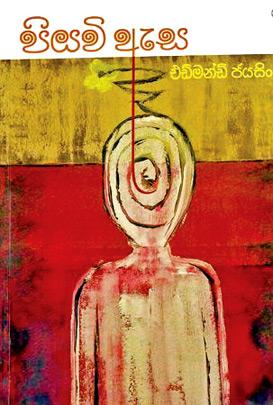
 Iread Edmund Jayasinghe’s Piyavi Aesa with great interest. It is a stunningly powerful novel. I find it dogmatically sociological. Edmund presents it as a love story, plus the contemporary features of political, economic, and social repercussions of the present day society. These facts are demonstrated strongly.
Iread Edmund Jayasinghe’s Piyavi Aesa with great interest. It is a stunningly powerful novel. I find it dogmatically sociological. Edmund presents it as a love story, plus the contemporary features of political, economic, and social repercussions of the present day society. These facts are demonstrated strongly.
Experience floods effortlessly in his writing. It transcribes to the text convincingly. It becomes superbly crafted and prodigious, though appears simple. Subject matter is well balanced. It affects the reader positively spellbound, and enthusiastically undisturbed.
The theme of the novel is for an idealistic drive. It is to create for the wellbeing of the people. It is a very well planned and anchored project, namely Piyavi Aesa. Principally, two University students, Hewa and Nirmali, charismatically and spiritually coupled in love are the originators of the project.
They are dedicated, consecrated, and determined finally to achieve the outcome of their goal with no selfishness but to reap it for the collective good of the society for its prosperity and dynamic activity fulfilling contentment and cheerfulness. It’s a self-soul march. This ideal project is a social gift to the present day political ambiance.
Political arena
It’s unfortunate as the novelist demonstratively hints that our country’s political arena is sullied by corruption, defraud, and selfishness. There is no care for the commoner. Looking after their welfare is a must. Author draws examples of the world that escalate societal welfare. For this, he likens the Nordic countries.
He takes them as ideal nations that uplift social, economic and political betterment of the people. People of such nations live happily and prosperously without taking sides or being rebellious. These exampled countries’ Governments and societies he glorifies. Such Governments are benevolent, patriotic, and serve the societal beings equally. They are economically rich and societally strong and contented.
Contrastingly, the author negatively and realistically validates the Asian nations, particularly Sri Lanka. The last is in dynamic dilemmas. No care and consideration for the perfection of the down trodden souls’ status. They are only tools for the use of the wealthy, especially the political goons.
The most salient feature of the novel is the mode, the author utilises to establish the diversity of the families and their subjects. Family wise, they are different. Mainly there are three types.
One family is very traditional, familial, humane, social, and prosperity wise extensive with serfdoms. This family reminds of the Kandyan hierarchal families. With the changes of times, serfdom patterns dwindle. Cultivable lands in small proportions pass on to the serfs.
Serfs gain emancipation and become individualistic. Yet they maintain the typical psychologically embedded restraint and respect for the elders.
Self-centeredness
The second type had been very poor and had hard times. Through hard work, they become rich, are exhibitive, in control of labour in their industrial enterprises. They are mostly self-centered with much of selfish outlooks, less humane, pride in social behavioural patterns, quite pompous and individualistic, except Nirmali. She is profound, disciplined, meticulous, non-bombastic, and determinedly working for social justice and advancement originated by her fiancé, Hewa. Her brother is a lawyer but emptily very showy and characteristically insensitive and shallow. He is typically selfish and awfully craving distancing his sister (Nirmali) from the wealth of the family.
The third type is a combination of both categories being modernistic, social and opulent. The son of the family (Ranith) who is well educated and working in a bank marries from the first category of the families.
Yet he is extra ordinarily outgoing with his friends and playful as he used to be. He is the same even after marriage, not paying much attention to his wife. This is a dilemma for the wife.
Finally, at the very end, the novel becomes highly symbolic through Hewa. He spends a long period in remand for an offence he had not committed, but for a well wished beneficial cause he had initiated, supported, and carried on for societal advancement until it fruits to the fullest in society.
Secondly, it is symbolic because of the two types of marriages that take place with the first type of family affiliates and the partners of the second and third family types. One is wonderfully stable and with psyches’ love. This occurs only by registration without grandiose parties.
The other marriage is standard and traditionally ostentatious, but seems to be on the brink.
I recommend Piyavi Aesa to the public, particularly to the politicians and their supporters.
